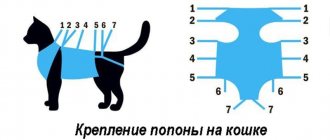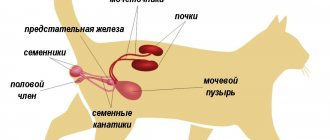Many owners ask veterinarians whether castration of an adult cat is possible. Doctors do not recommend surgery after two years of age. But with proper preparation and care of the cat, intervention can be performed at 5-6 years of age. Before the procedure, the veterinarian will prescribe tests, as well as repeated vaccinations. After castration, you should carefully monitor your pet’s condition in order to identify complications in time.
Is it possible to castrate an adult cat?
The recommended age for the procedure is from 8 months to a year. This is the optimal period, since early castration can harm the animal’s genitourinary system. But you can castrate cats after a year. The procedure makes sense at any age. It is better to solve this problem as early as possible so as not to harm the health of your pet. To find out for sure whether the operation can be performed, it is worth taking tests at a veterinary clinic. But there are also indications for castration of a cat at 2, 3 or 4 years of age:
- prostate hyperplasia;
- testicular diseases;
- high level of aggression;
- urinary incontinence;
- oncology;
- hereditary pathologies;
- hormonal imbalances.
Why is castration (sterilization) necessary?
Why castrate? If a cat is constantly staying (living) in the enclosed area of a city apartment, the needs dictated by libido are a regular source of concern for the animal and the owners. The animal gets nervous, tries to mark its territory, and makes loud beeps at the most inopportune times of the day. If the cat is not intended to reproduce and cannot satisfy this natural need, castration is the only possible solution.
In a sterilized cat, the production of estrogen (the hormone of sexual activity) is blocked. This effect prevents the development of low-quality tumors of the mammary glands, uterus or ovaries in the pet.
Let's summarize the positive effects of castration. What does a castrato look like and behave after surgery:
- Becomes calm and affectionate;
- No longer marks territory;
- Does not try to escape from the house through the doors or out the window;
- There is no risk of contracting a viral infection;
- Protected from prostatitis, adenoma and other tumors.
These factors together contribute to increasing the pet's life expectancy.
Negative consequences of the procedure (cons):
- Probability of urolithiasis;
- Weight gain and cardiac diseases as a result of decreased activity;
- In older animals, complications from anesthesia are possible, so it is recommended to operate before the age of three.
Reasons to spay females (pros):
- Birth control;
- Correction of behavior (during periods of sexual activity, the female is restless, loses appetite, and marks her territory);
- Protection against infections.
Risks associated with sterilizing a female:
- the likelihood of complications during anesthesia;
- sterilized individuals are sedentary and prone to obesity.
Photograph of a cat's genitourinary system
Why castrate?
An operation for an old cat is needed to preserve his health, because promiscuity with street animals can lead to infection of the cat. Moreover, in fights with other cats, a pet can be seriously injured.
With the help of this procedure, it will be possible to pacify the furry’s aggression towards household members.
An animal that is constantly in the apartment suffers from unsatisfied sexual desire and becomes more aggressive over time: it begins to tear up furniture, attack, and meow loudly. If the owner believes that it is possible not to sterilize the pet, but simply give it hormonal pills to suppress instincts, then this is wrong. Such drugs often cause illness. Castration of an old cat allows you to get rid of an unpleasant odor and make your pet calmer and more affectionate.
Will the cat survive such an operation?
People often hesitate to castrate an old cat because of the risk of complications. In practice, negative consequences rarely occur. Volunteers castrate and neuter homeless animals en masse. Veterinarians do not know the exact age of street cats. In most cases, operations proceed without complications. Stray animals are released immediately after they recover from anesthesia.
Pets are under the supervision of their owners, live in comfortable conditions, and eat well. They experience complications even less frequently than homeless people. However, this only applies to cases where there are no contraindications for surgery and the cat itself is healthy.
Anesthesia is dangerous in castration. An adult pet tolerates and comes out of it well. Older cats may have problems. Therefore, after anesthesia, it is recommended that old pets be given IVs. This way, they will recover from anesthesia faster, and the load on the heart, liver and kidneys will decrease.
With proper anesthesia and following the veterinarian’s recommendations, all cats, including adults and elderly, can withstand castration.
Preparing for surgery
The same for both an adult pet and a teenage kitten. Before the operation begins, the pet is prescribed a preoperative diet: the cat cannot be fed 12 hours before castration. In addition, doctors must vaccinate and treat the animal against parasites. This is necessary to prevent the occurrence of infectious diseases. Deworming is done 2 weeks before the procedure. Castration of a cat at 7 years old is the age limit for an elderly pet. Older cats may react negatively to anesthesia, so doctors often do not recommend surgery for cats older than 5 years.
During the preparation of the animal for the procedure, it needs to have an ECG.
Conduct research to identify contraindications:
- blood and urine tests;
- checking for allergic reactions;
- X-ray;
- cardiogram;
- ultrasonography.
Old male
It is advisable to castrate. For reasons that have not been sufficiently studied by doctors, in some male dogs the prostate continues to grow after puberty. Increasing in size, it compresses the ducts of the prostate gland with its own tissues, which contributes to the formation of cysts in the prostate tissue. A cyst is a cavity filled with fluid. The prostate, among other things, is a kind of barrier for pathogenic flora between the external and internal genital organs. With the enlargement of prostate tissue and the formation of cysts, this bacteriostatic function works “the other way around” - in an altered large prostate with cysts, bacteria easily accumulate and can cause inflammation in the gland itself or migrate to other organs (usually the bladder becomes the first on the way). In this case, pathologies such as bacterial prostatitis, prostate abscess, and bacterial cystitis develop. The growth of the prostate is regulated by hormones produced by the testes; accordingly, after castration, for about 2 months, the growth of the prostate will stop and it will begin to decrease in volume. In the future, most of the cysts may disappear, and the barrier function of the organ will be partially or completely restored.
Take care of the health of elderly pets!
Features of the procedure
When a cat is neutered, his testes are removed. Thus, the animal stops producing hormones and stops sexual activity. If a pet is diagnosed with cryptorchidism (one of the testicles is not in the scrotum), then the sunken testicle is cut out. In addition, such individuals are not allowed for breeding. But it should be remembered that hormones do not disappear from the body immediately after the procedure. Therefore, the cat’s hormonal background will become stable only in a month. Another way of performing the procedure is a vasectomy, in which the cat is spayed. With it, the veterinarian does not touch the testes, but cuts the canal next to them. Thus, sperm does not enter the seminal duct, and the cat’s hormonal levels do not change.
Methods of castration of “elderly” cats
As in other cases, the main method to this day is classical surgical castration using the bloody method. But! If young pets can be sterilized using only local anesthesia, general anesthesia is required for “veterans” . The fact is that adult pets are much more sensitive to pain, and therefore heart problems cannot be ruled out.
In addition, the technique of the operation itself has some peculiarities. Unlike kittens, in the case of which it is enough to apply a ligature and cut off the “unnecessary” testis, you have to work longer with cats. The problem is that they have a very wide inguinal ring. If it is not narrowed by applying several rows of purse-string suture, the neutered pet’s insides may begin to fall out (in the literal sense of the word).
Castration using closed methods is also strongly discouraged. Firstly, as we have already said, an adult pet is sensitive to pain (with percutaneous crushing of the testes). Secondly, applying a ligature directly to the serous membrane of the scrotum in such cases is extremely contraindicated: the organ is too rigid and it is unlikely to completely block the blood flow.
What to do if you are the owner of a very middle-aged cat, but his spring sprees do not cause delight? In such cases, it is advisable to resort to medical castration . An implant is sewn under the cat's skin. The substances released from it reduce the sexual activity of the animal. At the moment, the most popular drug is Suprelorin.
Consequences for the animal
Often after the procedure, animals begin to gain extra pounds.
Complications after surgery are rare, even if a cat is castrated at 6 years old. After castration, cats begin to gain weight, so owners should monitor their diet. In some adult pets, on the contrary, the character deteriorates. Such changes are associated with stress during surgery. In addition, if the aggression was caused by non-hormonal fluctuations, then after sterilization it will not disappear.
Adult cats may develop the following consequences:
- bleeding;
- loss of part of the oil seal;
- prolapse of intestinal loops.
Contraindications to castration
The presence of chronic diseases, depending on their severity, may be a contraindication to castration.
An adult cat may suffer from chronic diseases for which surgery is contraindicated.
Organic pathologies, sluggish chronic viral infections, epilepsy, diabetes - if the cat has a serious diagnosis, then the owners will either have to abandon surgical castration in favor of an alternative, or contact the most highly qualified specialists.
Post-operative care
Castration of Siamese cats or other breeds is a simple operation and therefore does not require special care. Doctors recommend monitoring the animal’s behavior in order to identify complications in time. Pets tend to lick the wound, so it is advised to buy a special cat collar. To prevent the seams from coming apart, a blanket is put on the cat. You should wear it for the first 2-3 days. It is better to place your pet's sleeping place near the floor so that it does not fall and get hurt. It is advisable to buy filler for the tray in a light color: against such a background it is easier to notice drops of blood if complications such as bleeding occur. Sutures should be treated with ointment 2 times a day. If you follow all these rules, then castration will only improve the cat’s life.
To prevent the animal from touching the seams again, you should buy him a protective collar.
Postoperative cat care
After the castration procedure, in the first days the cat requires additional attention and organization of care. Veterinarians, as a rule, suggest leaving the animal in the clinic until the effect of anesthesia ends (rehabilitation).
Rules to follow after surgery:
- Within 24 hours (on the first day) after castration, the cat should not be given food to avoid vomiting and subsequent inhalation of vomit. The animal can start drinking water four to six hours after waking up.
- The cat will not immediately regain control of movements and may fall off the table or sofa; anesthesia affects coordination. Before regaining consciousness, it is better to place the animal on the floor, laying down a diaper in case of arbitrary urine leakage.
- Make sure that the cat does not suffocate by burying her nose in something and blocking the air supply.
- Avoid exposure to bright light that irritates your vision when waking up.
- Medical anesthesia leads to a decrease in body temperature to one and a half degrees. If the room is cold, you need to take additional measures to protect the cat from hypothermia: cover it with a blanket and place it close to a heat source.
- Take care of your eyes. Until the cat finally wakes up and her blinking reflex is restored, periodically drip sterile liquid (saline solution, water for injection, antibacterial eye drops without antibiotics) into the conjunctival cavity of the eye.
- Ensure peace, limit contact with other animals and children, since the period after anesthesia is characterized by altered behavior. The aggressiveness of a cat is a temporary effect, there is no need to be scared; after a while, British cats behave as usual.
- Temporarily replace special cat litter with napkins or pieces of paper to prevent dispersed particles from getting into the wound.
- Monitor the condition of the wound. If there is discharge, dry the wound (treat it with a sterile cloth).
- Limit the animal's access to the surgical site. Clean cats will tend to lick the wound or seam, and this will slow down the healing process. Wearing a veterinary collar is recommended. This accessory will not interfere with eating, but will provide barrier protection for surgical sutures.
- Inspect the surgical site regularly, and if complications occur, consult a doctor immediately.
- In accordance with the doctor's prescription, treat with antibiotics.
The total duration of the recovery period after castration is up to 10 days. Boys tolerate surgery well in most cases.
Scheme of blankets for cats and dogs
Recommended age
Of course, it is better to do everything on time. Performed at an early age, this operation is easier for animals and does not threaten any complications. The optimal age is 7 months - 1 year. By this time, the pet has completed its maturation and formation. If the operation is performed earlier, the genitourinary system will remain underdeveloped. As a result, there will be a high chance of developing urolithiasis. Veterinarians usually recommend 9 months of age.
Is it possible to castrate an adult cat? Of course it is possible. But if he has already mated or has a bad habit of marking territory, which is also closely related to sex hormones, then castration may not solve the problem. In some cases, males continue to sing songs and leave marks, which, however, become less “fragrant.”











